From an early age, Dick Peixoto spent every free minute learning how to farm. At the age of 17, he started farming conventional crops along California's Central Coast, in Watsonville. Although he owned the land, he was strictly a grower and had no control over harvest or sales. "I didn't like that model and started looking over the fence to see how others did it," Peixoto said. "I saw opportunities in organic farming and decided to convert land to certified organic in 1996, selling produce under the Lakeside Organic Gardens label." By 2000, the entire farm had converted to organic. Large retailers such as Whole Foods were interested in doing business with Lakeside, but year-round supply was a requirement. That's when Peixoto decided to purchase land in California's Imperial Valley for production during the winter months. Today, the company owns 2,000 acres of organic farmland along California's Central Coast and another 1,200 acres in the Imperial Valley, providing retailers and wholesalers across the United States with organic produce year-round.
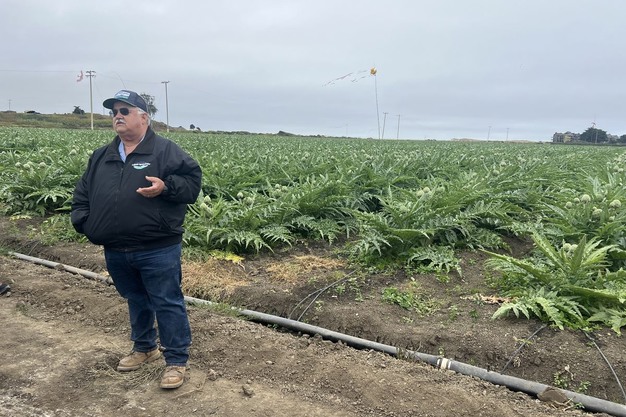 © Marieke Hemmes | HortiDaily.com
© Marieke Hemmes | HortiDaily.com
Dick Peixoto, Lakeside's owner, talks to field tour attendees.
Artichoke and celery harvest
Peixoto shared his story during a field tour the company hosted yesterday as part of the Organic Produce Summit. The group had an opportunity to witness artichokes and celery being harvested. Artichokes are grown less than 0.5 miles from the ocean on the company's Beach Ranch. "This unique climate with cool weather in summer results in a high-quality item that can't be grown inland," shared Peixoto. In addition to the climate, the seeds also make them stand out from other artichokes. "We import the seeds from a seed company in the Netherlands. While they are expensive ($0.54/seed), they provide us with excellent artichoke yield, quality, and taste." The King chokes are the first and largest artichokes to get harvested from the plant and the group witnessed the crew making the first round of harvest through the field. Once the King chokes have been harvested, the other artichokes on the plant get an opportunity to grow in size and over a time frame of about 45 days, all fruit on the plant will get harvested. Harvesters walk the fields and put the harvested artichokes in a special backpack. A full harvesting backpack weighs about 120 to 130 lbs. As soon as it has been emptied, the artichokes are tagged and packed on the field.
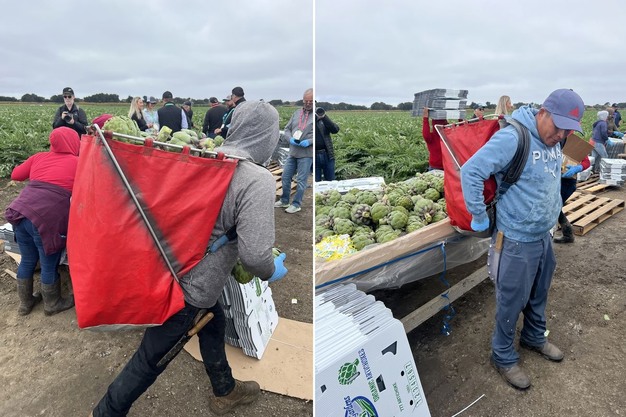 © Marieke Hemmes | HortiDaily.comA full harvester backpack weighs about 130 lbs.
© Marieke Hemmes | HortiDaily.comA full harvester backpack weighs about 130 lbs.
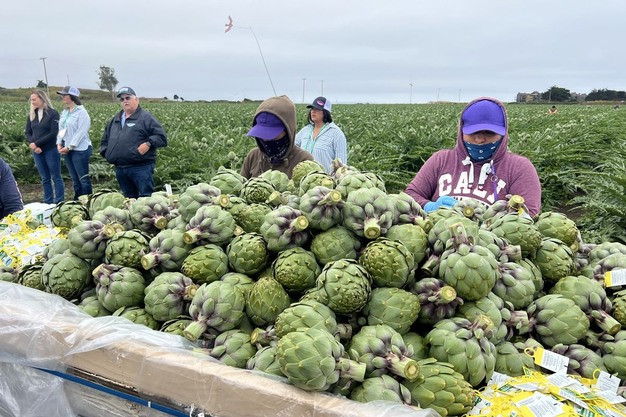 © Marieke Hemmes | HortiDaily.comArtichokes are tagged and packed on the field.
© Marieke Hemmes | HortiDaily.comArtichokes are tagged and packed on the field.
From the artichoke field, the group walked to the celery field where harvest was taking place as well. Each celery plant is being cut, and experienced field packers determine whether the celery bunch is a 24, 30, 36, or 48 ct. How are they able to see the difference in size? It's a specialized and experienced crew. Some have been involved in celery harvest for more than 20 years. Only the highest quality makes it into the company's Lakeside Organic Gardens label. Produce that doesn't meet the highest quality standards will get sold under the Oceanside label.
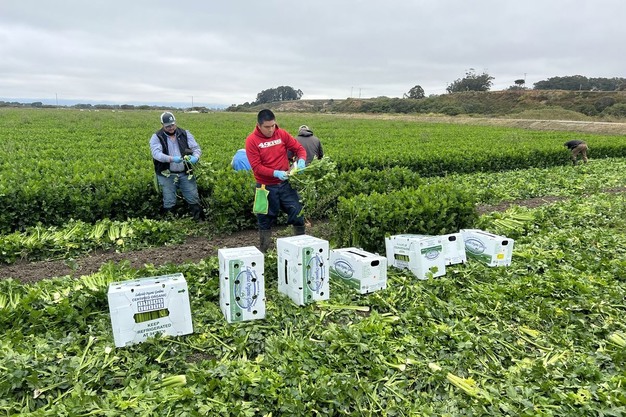 © Marieke Hemmes | HortiDaily.comCelery being harvested.
© Marieke Hemmes | HortiDaily.comCelery being harvested.
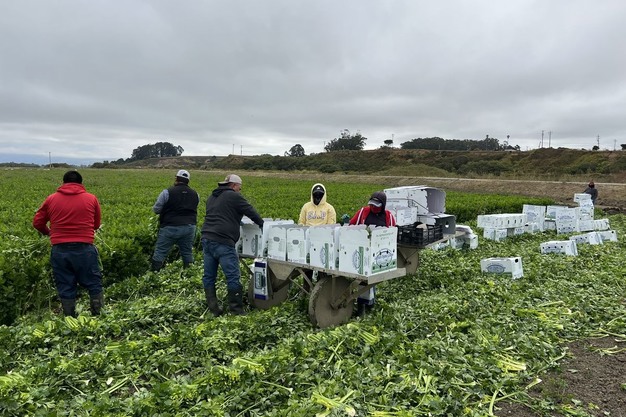 © Marieke Hemmes | HortiDaily.comCelery being packed.
© Marieke Hemmes | HortiDaily.comCelery being packed.
After the field visit, the group went over to the packing house that contains 55,000 sq. ft. of cooling space for all the 50 different commodities the company grows. The cooler was built by Lakeside Organic Gardens itself back in 2017, making the company fully vertically integrated. After the tour, a delicious lunch was served.
Hands-on farmer
Peixoto built the company with his bare hands and together with his employees, he manages 500 blocks of produce. He is a hands-on farmer who is very much involved in the day-to-day activities. "I put together the planting schedules and crop rotation plans and we have daily meetings to discuss what work needs to be done on each field," he said. Pests are one of the challenges of growing organic produce and crop rotation is key. "Only once every three years can a crop be grown on the same block". To prevent diseases from breaking through and simplify rotation, Peixoto has been partnering with berry company Driscoll's. "We use each other's land for rotation. I grow vegetables on some of Driscoll's land, and they grow berries on my land. We even rotate some of our tractors, benefiting each other."
 For more information:
For more information:
Elisha Cope
Lakeside Organic Gardens
Tel: (831) 761-8797
elisha@lakesideorganic.com
www.lakesideorganic.com
